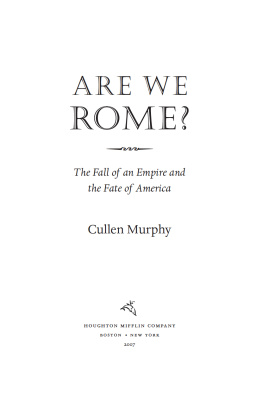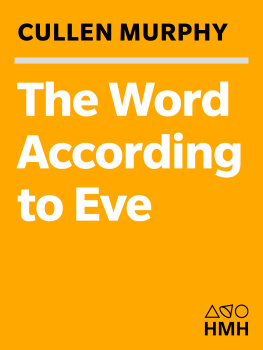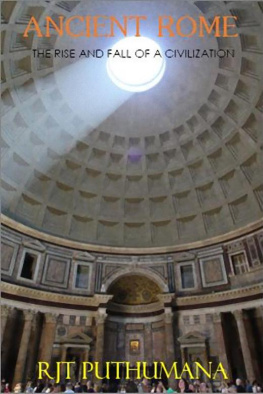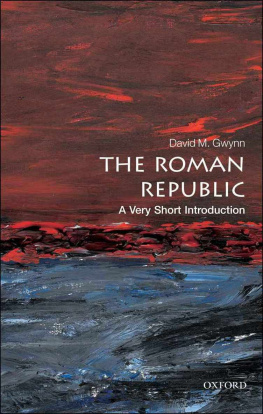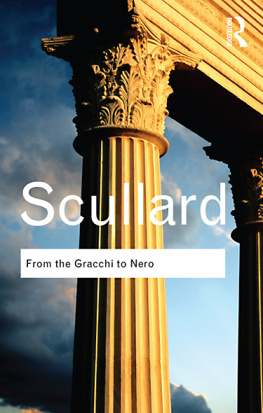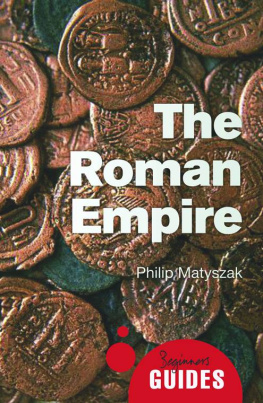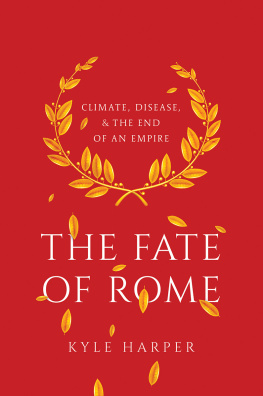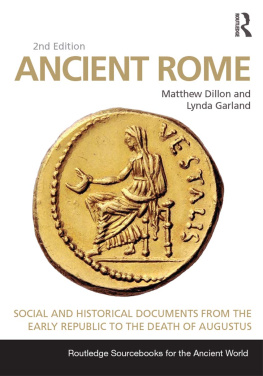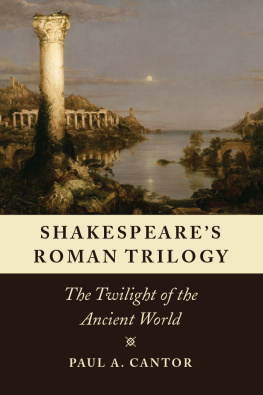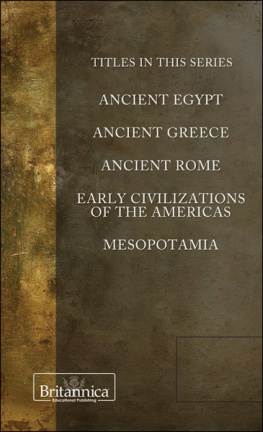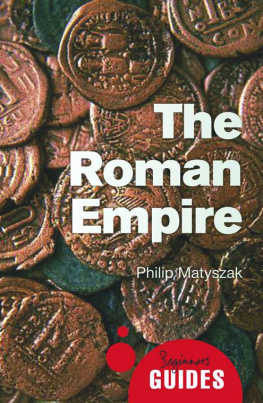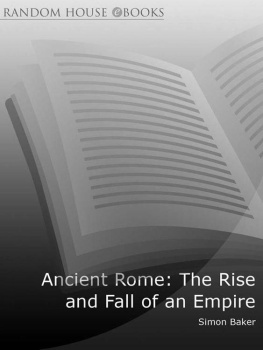Copyright 2007 by Cullen Murphy
All rights reserved
For information about permission to reproduce selections from this book, write to or to Permissions, Houghton Mifflin Harcourt Publishing Company, 3 Park Avenue, 19th Floor, New York, New York 10016.
www.hmhco.com
The Library of Congress has cataloged the print edition as follows:
Murphy, Cullen.
Are we Rome? : the fall of an empire and the fate of America/ Cullen Murphy
p. cm.
Includes bibliographical references.
ISBN -13: 978-0-618-74222-6
ISBN -10: 0-618-74222-0
1. United StatesCivilizationRoman influences.
2. National characteristics, American. 3. United States
Foreign relations. 4. United StatesTerritorial expansion.
5. Imperialism. 6. RomeHistory I. Title.
EI 169.1. M 957 2007
970.01dc22 2006035717
e ISBN 978-0-547-52707-9
v2.0216
Roman Wall Blues, from Collected Poems by W H. Auden, copyright 1976 by Edward Mendelson, William Meredith and Monroe K. Spears, Executors of the Estate of W H. Auden. Used by permission of Random House, Inc.
Prologue
The Eagle in the Mirror
Urbs antiqua fuit.... Urbs antiqua ruit.
There once was an ancient city.... The ancient city fell.
Virgil, The Aeneid
I MAGINE THE SCENE : a summer day, late in the third century A.D. , somewhere beyond Italy in the provinces of the Roman Empire, perhaps on the way to a city like Sirmium, south of the Danube, in what is now Serbia, where several roads convergegood Roman roads of iron slag and paving stone. The Roman road system is immensemore than 370 separate highways stretching some 53,000 miles all told, about the length of the U.S. interstate system. In these difficult final centuries of the imperium a Roman emperor travels constantly, and his progress makes for quite a spectacle. The peasants raced to report what they had seen to the villages, a contemporary remembers. Fires were lit on the altars, incense thrown on, libations poured, victims slain.
The emperor here is perhaps Diocletian, a man of the hinterland, from Dalmatia, and wherever the emperor resides, so resides the imperial government, although Rome itself will long retain its symbolic characterwill long be referred to as the city even by people five hundred miles away. Who is this Diocletian? No friend of the Christians; he is a traditional Roman values man, and his persecutions are intense. But he has restored Romes stability, at great cost, and in his travels he projects Romes power. Before the emperors arrival, advance men known as mensores would have been sent ahead to requisition supplies and arrange for security. If you have business with the imperial court, perhaps bearing a petition from your beleaguered city or a plea from your patrician family, and make your way toward the emperors encampment, you will encounter other supplicants like yourself. Some of them may have been following the emperor for weeks or months. You will also encounter a defensive ring a few miles outside your destination, and find the roads dense with military traffic; and as you draw closer, the character of the armed forces will change, from auxiliaries to legionaries to the imperial bodyguard, a force known as the protectores. The imperial eagle flutters on their standards.
At last, in the center, you find the comitatus itself, the sprawling apparatus, several thousand strong, that encompasses not only the emperors household and its personnelthe eunuchs and secretaries, the slaves of every variety (the emperor may own 20,000 of them)but also the ministries of government, the lawyers, the diplomats, the adjutants, the messengers, the interpreters, the intellectuals. And of course you also find the necessities of life and the luxuries, the rich food and drink. Gone is the simple camp fare of Trajans day, the bacon, cheese, and vinegar. A letter survives describing the table laid for just one Roman dignitary (and four companions) visiting Egyptten white-head fowl, five domestic geese, fifty fowl; of game-birds, fifty geese, two hundred birds, one hundred pigeons; multiply accordingly for the emperor and his household. And the ruler himself: How does he spend his time? Receiving petitions? Perhaps he remembers the famous story of one of his predecessors, Hadrian, who put off a pleading woman with the words I do not have the leisure, only to receive the reply Then stop being emperor! (Hadrian made time for the woman.) Consulting with his generals? Repairs to the Danube forts are an urgent necessity, given how many of the German tribes cross over every winter when the river freezes. Dictating letters and decrees? Maybe writing something in his own hand? An earlier emperor, Marcus Aurelius, composed part of his Meditations while on a military campaign along the northern frontier; Book One ends with the notation that it was written among the Quadi, the people he was fighting. Whoever the emperor may be, gathered around the august presence is the imperial government in microcosm, with its endless trunks full of documents; the wagons carrying the treasury and perhaps the mint itself; the blacksmiths and parchment makers; the musicians, courtesans, diviners, and buffoons; the people known as praegustatores, who taste the emperors food before he himself does; the people known as nomenclatores, whose job it is to call out the names of the emperors visitors, and who have given us the word nomenklatura, for the core group of bureaucrats and toadies who function within any nimbus of great power. All in all the comitatus is, in its way, the cluster of people who in our own time would be encompassed by the Washington e-mail designation eop.gov.
Or so it occurred to me one summer morning not long ago as my plane touched down in the rain at Shannon Airport, in the Republic of Ireland. The domain name eop stands for Executive Office of the Presidentthat is, the White House and its extensionsand as it happened, the president of the United States had arrived in Ireland shortly before I did, for an eighteen-hour official visit. His two Air Force One jumbo jets were parked on the shiny tarmac, nose to nose. The presidential eagle, a descendant of Romes, glared from within the presidential seal, painted prominently near the front door of each fuselage. A defensive perimeter of concertina wire surrounded the two aircraft. Surface-to-air missiles backed it up. The perimeter was manned by American forces in battle fatigues, flown in for the occasionjust one element of the presidents U.S. security detail, a thousand strong. Other security personnel peered down from the rooftops of hangars and terminals, automatic weapons at the ready. Ringing the airport was a cordon of Scorpion tanks supplied by the Irish Republic. A traveling president, too, brings with him a government in microcosm. Air Force One can carry much of the presidential comitatuscabinet members and courtiers and cooks, speech doctors and spin doctors. Provisioning has not been overlooked: the plane can serve meals for 2,000 people, the supplies bought anonymously at American supermarkets by undercover agents, the updated version of those praegustatores. And if theres a medical emergency? An onboard operating room is stocked with blood of the presidents type; his personal physician is at hand. From the planes command center a president can launch and wage a nuclear war, or any other kind, for that matter. The forward compartment is what passes for a throne room, containing the presidents leather armchair and his wraparound oak desk and his telephone with its twenty-eight encrypted lines.
Off in the mist would be the Air Force cargo planes, which had brought helicopters, a dozen Secret Service SUVs, and the official presidential limousine (plus the official decoy limousine), its windows three inches thick and its doors so heavy with armor that gas-powered pistons must be used to help open them. Four U.S. naval vessels plied the Shannon River estuary nearby. Outside the airport the roads were jammed with Irish soldiers and police officers6,000 in all, slightly more than an entire Roman legionand on even the tiniest boreens security personnel with communications piglet tails trailing from their ears would emerge from hiding places in the bracken if a passing car, like mine, so much as slowed to avoid some sheep.

